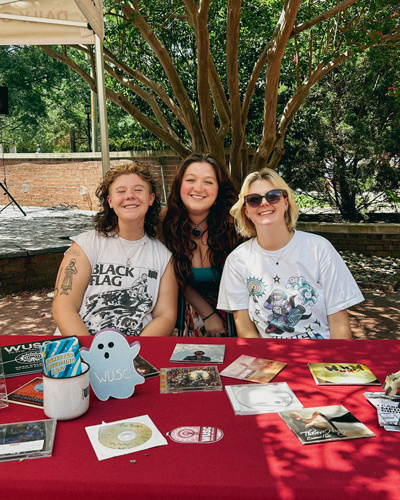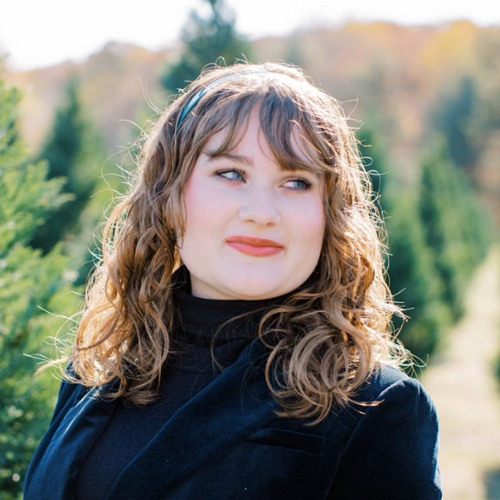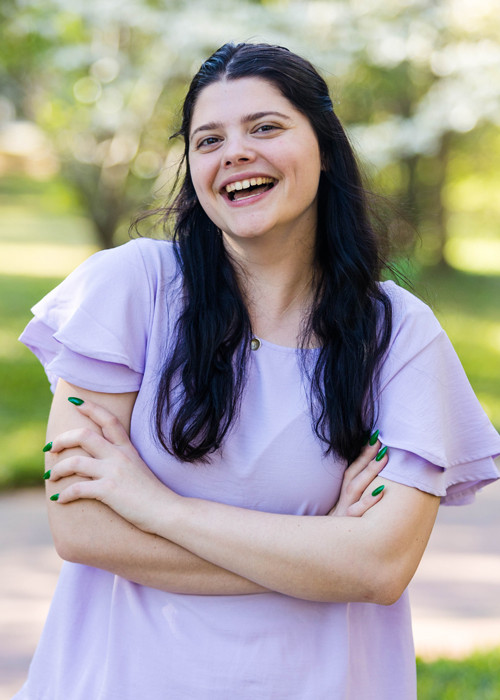Extra, extra! South Carolina Honors College students are covering campus happenings and student interests in all forms of media, from articles to airwaves — but that’s not all. They’re also honing leadership skills, exploring creative interests and building lasting relationships with their peers. Read all about the SCHC students who are leading, or have recently led, the WUSC radio station, Garnet & Black, Student Gamecock Television (SGTV) and The Daily Gamecock.
On air with “DJ Iz”
Make that Stamps scholar Izzie Rushton, station manager of WUSC, the student-run radio station. The junior biochemistry and molecular biology major started managing the station in the spring of 2024, but she’s been involved with WUSC since her first year on campus.
“We toured the music library,” she says, “and I thought it was so cool to be surrounded by that much music and to talk about all the artists that I didn’t think anyone else knew about, that I decided to be a DJ.”

Throughout her time at the station, she’s played important roles on the air and behind the scenes, hosting a show called “In a Pickle” and serving as the training director. As the current station manager, she attests that some of her favorite moments have happened off the air.
“One of my proudest moments was, as station manager, when several of the DJs I had trained during my time as training director became members of the executive staff that I oversee,” she says. “It was cool to see people I had gotten excited about radio actually follow through with their own leadership opportunities.”
Rushton has appreciated the opportunity to tap into her creative side, which isn’t always possible in her STEM major. Though it’s no small feat to balance the responsibilities of running a radio station with her full-time course load, Rushton considers WUSC to be one of the most impactful experiences of her college career. She credits her community of fellow DJs and encourages other students to consider taking up the mic.
“WUSC is not just for people who want to go into radio!” she says. “If you like podcasts, news reporting, interviewing, music production, being in a band or even if you just like music, WUSC has so many things to offer, and we’re constantly changing to better suit the interests of our members.”
“They never cease to amaze me!”
So says junior English major Kaylen Pritchard, editor-in-chief of Garnet & Black. She’s talking about the student-produced magazine’s creative team, which she’s led for about a year. Enticed by the magazine’s blend of journalism and creative writing, Pritchard joined G&B her first semester on campus and worked up the masthead from features writer to managing editor to editor-in-chief.
“When I first became editor-in-chief, there were a lot of turnovers happening within the magazine leadership,” Pritchard recalls. “We started the semester with a very small staff, which was initially daunting.”

While navigating these difficulties, Pritchard says that she developed her leadership skills, learning to trust her creative team while still editing with an eye for detail and precision. In turn, the G&B staff has grown in confidence, as well. What was once a sparse team has grown into a fully-fledged operation, producing two print issues per year and a collection of online content.
“My proudest moments as the leader of a student media organization are when staff members with whom I have worked since their freshman years feel confident enough in their abilities to take them to the next level,” says Pritchard. “It's so gratifying to act as a mentor or reference for my folks applying for internal leadership positions, internships and postgraduate jobs.”
In addition to growing as a leader, Pritchard has also appreciated the opportunity to develop her writing skills. Her G&B portfolio earned her a summer news reporting internship, and she credits her journalism skills with bolstering her academic research abilities. She’s adamant that G&B is an excellent opportunity for students of all majors to grow through creativity and journalism.
“I wish more people knew that you do not have to be a student in the journalism school to be successful in student media!” she says. “Our staff members have come from all sorts of degree programs, from biochemistry to Russian.”
One afternoon in the SGTV office
It’s a seemingly commonplace memory for Caroline Smith, 2023 station manager of SGTV, though a significant one. The senior human resources management major recalls an afternoon when the office was “practically bursting at the seams with passionate student journalists.” For Smith, who has also served as SGTV’s training director and helped many of these students get their start in broadcasting, the bustling office scene affirmed her efforts.
“My proudest moment in SGTV was then, when I realized how important it is for people to feel passionate about being part of something,” says Smith, “and how honored I was to be trusted with the responsibility of creating that space for over 200 talented and dedicated student journalists.”
Inspired by how much she enjoyed reading the morning announcements at her high school, Smith joined SGTV soon after starting her first semester at USC. She wanted to connect with campus on air and behind the scenes, and as she took on more leadership roles, her community and problem-solving skills grew. From working with talent to troubleshooting technology, she’s developed the skills necessary to navigate various challenges.

“Yes, an organization as large, diverse and involved as SGTV can teach practical and technical skills that are directly applicable to the workforce,” she reflects, “but I know that the more valuable things I’ve learned are the soft skills relating to relationships and human emotion.”
After her one-year tenure as station manager, Smith reassumed her training director duties for the fall 2024 semester. She hopes that more USC students will take an interest in the station and the immersive learning opportunities it provides; and, as Smith attests, campus news — which is editorially independent — has more influence than some students might realize.
“When students and others in the USC community tell us their stories, we have the resources to tell those stories louder so powerful people have no choice but to hear them,” she says.
“The truth is that I didn’t know anything about journalism coming into college.”
A candid take from senior multimedia journalism major Kate Robins, immediate past editor-in-chief of The Daily Gamecock. But her story proves that pursuing new opportunities can lead to rewarding experiences and career clarity.
“I never read the news in high school — I really didn’t care to — and I didn’t know how to go about writing an article,” says Robins. “One of the people who gave us a tour of the journalism school encouraged everyone to join one of the branches of Garnet Media Group because it would help advance our skills.”
She started on the copy desk team, as writing still felt “too personal,” but with time, her skills and interests pushed her to take on leadership roles. After serving as assistant copy desk chief, summer managing editor, and managing editor, Robins realized two things: She was interested in a reporting career, and she was ready to lead the newspaper. As editor-in-chief, Robins led an editorial staff of over 30 students each semester and recruited over 150 throughout her tenure.

“From managing your staff to handling complaints from sources or people across the university on articles, you have to be constantly managing conflict or solving a new problem,” Robins reflects. “But I think that some of the most major challenges I have encountered have all been with discovering who I am as a leader of a paper.”
Being the editor-in-chief taught her to view decisions with the same keen eye she uses when editing prose: Robins learned to choose which editorial battles were worth pursuing and which needed to be let go. She also navigated leading a group of peers, many of whom have been at the paper as long as she.
“It’s helped me overall to understand people more and how to change my style of working and communicating to fit the needs of those around me,” says Robins, “which I think is an important skill to have in any field.”
As she reflects on her time with The Daily Gamecock, she hopes that more USC students will learn about all the work and time that goes into producing the publication — work that she has been doing for almost four years.
“The truth is that we do care,” she says. “We understand that we are privy to information and have access to things that the average person may not, and we have conversations daily about how to make sure we’re being ethical, accurate and transparent.”
